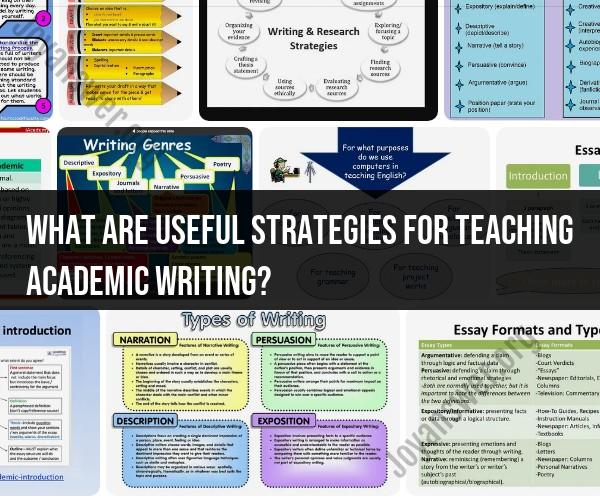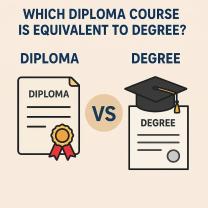What are useful strategies for teaching academic writing?
Teaching academic writing can be a challenging but rewarding endeavor. Here are some effective strategies for teaching academic writing:
Understand the Writing Process: Familiarize students with the writing process, which includes prewriting, drafting, revising, editing, and proofreading. Emphasize that writing is a recursive process, and it's okay to go back and revise their work.
Provide Clear Expectations: Clearly communicate the assignment requirements, including the purpose, audience, length, formatting, and grading criteria. Use rubrics or checklists to make expectations explicit.
Start with Brainstorming: Encourage students to brainstorm ideas before they start writing. This can involve mind maps, outlines, or free writing to generate ideas and organize their thoughts.
Teach Research Skills: Help students develop effective research skills, including how to find credible sources, evaluate information, and properly cite sources using a citation style (e.g., APA, MLA, Chicago).
Focus on Thesis Statements: Teach students how to craft strong thesis statements that clearly express the main argument or purpose of their writing. A good thesis statement guides the entire paper.
Paragraph Structure: Emphasize the importance of clear topic sentences and well-structured paragraphs. Teach students how to develop and support their ideas within each paragraph.
Teach Transitions: Show students how to use transitional words and phrases to create cohesion and flow between sentences and paragraphs. This helps the reader follow the writer's logic.
Model Writing: Provide model essays or papers that demonstrate effective writing techniques and structures. Analyze these examples with students to highlight what makes them successful.
Peer Review: Incorporate peer review sessions where students exchange drafts and provide constructive feedback to their peers. This helps them see different writing styles and learn from each other.
Grammar and Mechanics: Address common grammar and punctuation issues that students may struggle with. Consider dedicating specific lessons to grammar and editing.
Writing Workshops: Organize writing workshops or conferences where students can meet one-on-one with you to discuss their writing, ask questions, and seek clarification.
Provide Writing Prompts: Offer a variety of writing prompts that encourage critical thinking and creativity. Prompts can relate to course content or broader topics.
Scaffold Assignments: Start with shorter, less complex writing assignments and progressively move to longer, more intricate tasks. This helps students build confidence and skills over time.
Encourage Revision: Stress the importance of revising and rewriting. Allow students to revise and resubmit their work after receiving feedback.
Offer Resources: Share resources such as writing guides, style manuals, and online writing labs (e.g., Purdue OWL) that students can refer to for additional support.
Individualized Feedback: Provide specific, constructive feedback on students' assignments. Point out strengths and areas for improvement in a way that helps them grow as writers.
Reflect and Revise: After completing an assignment, have students reflect on their writing process and what they've learned. Encourage them to carry these lessons forward to the next assignment.
Celebrate Improvement: Acknowledge and celebrate the progress students make in their writing. Recognize their efforts and growth as writers.
Promote a Growth Mindset: Encourage a growth mindset, where students believe that writing skills can be developed through effort and practice. This can boost their motivation and confidence.
Provide Real-World Context: Show students how academic writing skills are transferable to real-world situations and various career paths.
Remember that teaching academic writing is an ongoing process, and students may progress at different rates. Be patient, provide support, and create a positive and constructive learning environment to foster improvement in their writing skills.
Effective Strategies for Teaching Academic Writing
Academic writing is a skill that takes time and practice to master. However, there are a number of effective strategies that teachers can use to help students improve their academic writing skills.
One important strategy is to provide students with clear and concise instructions on the specific writing tasks that they are expected to complete. This includes providing students with information on the purpose of the task, the audience, the required format, and the grading criteria.
Another important strategy is to model good academic writing for students. This can be done by providing students with examples of well-written academic essays, articles, and other texts. Teachers can also model good academic writing by writing and sharing their own academic writing with their students.
In addition, teachers should provide students with opportunities to practice their academic writing skills. This can be done through in-class writing exercises, take-home writing assignments, and collaborative writing projects. Teachers can also provide students with feedback on their writing to help them identify areas where they can improve.
Here are some additional effective strategies for teaching academic writing:
- Teach students the conventions of academic writing. This includes teaching students how to use formal language, cite sources correctly, and format their papers according to academic style guides.
- Help students to develop their critical thinking skills. This includes teaching students how to analyze and evaluate sources, develop their own arguments, and support their claims with evidence.
- Provide students with opportunities to revise and edit their work. This is an important step in the writing process that can help students to improve their writing skills and produce high-quality work.
Enhancing Academic Writing Skills: Proven Teaching Techniques
There are a number of proven teaching techniques that teachers can use to enhance academic writing skills. Here are a few examples:
- Use graphic organizers. Graphic organizers can help students to organize their thoughts and ideas before they start writing. This can help students to write more focused and coherent essays.
- Teach students how to write thesis statements. A thesis statement is a clear and concise statement of the main argument of an essay. Teaching students how to write thesis statements can help them to focus their writing and ensure that their essays have a clear purpose.
- Use peer review. Peer review is a process in which students review each other's work and provide feedback. Peer review can help students to identify areas where their writing can be improved.
- Provide students with opportunities to write for different audiences. This can help students to develop the flexibility to adapt their writing style to different contexts.
- Use technology to enhance the writing process. There are a number of technology tools that can help students to improve their writing skills. For example, students can use word processors to check their grammar and spelling, and they can use online resources to find and cite sources.
Empowering Students in Academic Writing: Practical Strategies
There are a number of practical strategies that teachers can use to empower students in academic writing. Here are a few examples:
- Create a positive and supportive learning environment. In a positive and supportive learning environment, students feel comfortable asking questions and taking risks with their writing.
- Provide students with choices. Giving students choices about what to write about and how to write about it can help to motivate them and empower them to take ownership of their learning.
- Encourage students to be reflective writers. Reflective writing is a process in which students think critically about their writing and identify areas where they can improve. Encouraging students to be reflective writers can help them to develop their academic writing skills over time.
By using these effective strategies, teachers can help students to improve their academic writing skills and become more confident writers.












